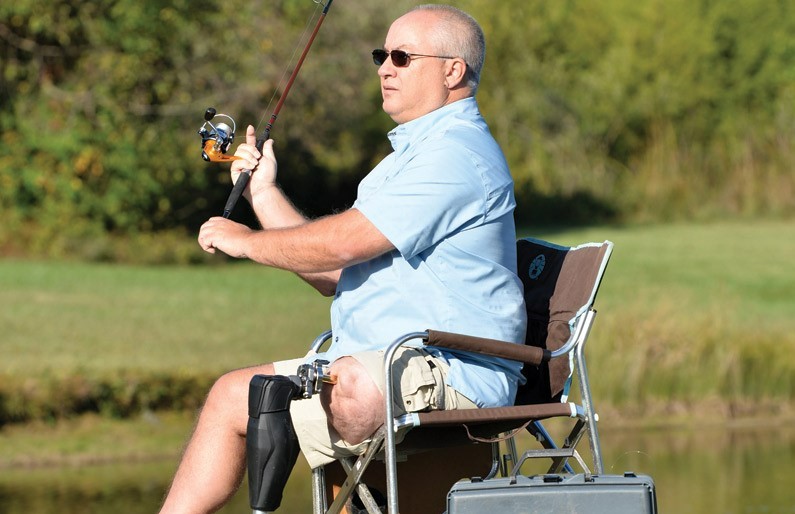Premier Prosthetics not only provides its patients with the highest level of convenience and care; their certified prosthetists are at the forefront of emerging technologies and practices that have a direct impact on their patients’ quality of life. One such patient, Kelly Prince, underwent a procedure called osseointegration that is a major advancement in amputation surgery in the U.S.
Prince, 54, was diagnosed with bone cancer in 2011. After multiple surgeries, he underwent a transfemoral amputation to remove his leg above the knee. He began working with Premier Prosthetics prosthetist Matt Ruengert after his amputation, using a traditional socket prosthetic. A few years ago, Prince’s orthopedic oncologist mentioned osseointegration surgery as a revolutionary new procedure that, at the time, was only being done overseas.
The procedure involves using a metal rod implant directly anchored to the residual bone, which is then attached to a prosthetic limb using a transcutaneous connector through a small opening in the skin. While traditional prosthetics require users to wrap the residual limb in a “shrinker” to fit into the prosthetic socket, osseointegration allows the prosthetic to simply and quickly snap on to the connector. The implant being anchored to the residual bone allows for a more natural control of that bone and the prosthetic leg.
A team in Denver, Colorado was the first in the U.S. to begin doing trials of the surgery, and Prince was one of only five patients to be accepted in the trial. After being accepted, the prosthetist on the team in Denver began talking to Ruengert at Premier about what Prince’s needs would be when he returned.
“Matt has been awesome,” Prince says. “I was very fortunate because, with some of the other people in the trial, their home prosthetists wouldn’t touch it because they were afraid; but Matt was like bring it on.” He underwent the two-stage surgery in 2019.
When he returned to St. Louis, the prosthetist in Denver would FaceTime with Ruengert while Prince was there to discuss what they needed moving forward. Prince continues to meet with Ruengert regularly to make small tweaks. He calls the team at Premier Prosthetics his “medical family.”
Prince says the benefits of not having a traditional socket prosthetic are immeasurable—primarily
being free of the pain and skin irritation it would often cause him. “I had so much nerve pain that I sometimes would be lucky to walk 1,000 steps a day,” he says. “Now, it’s nothing for me to get 12,000 to 15,000 steps in. I can take it on and off in seconds, and it lines up the same way every time. It’s such a quality of life enhancement.
343 S. Kirkwood Road, Ste. 200
314.262.8900
premierpatndo.com
